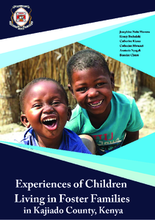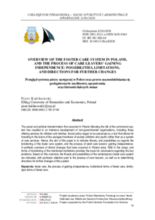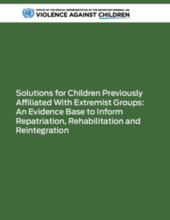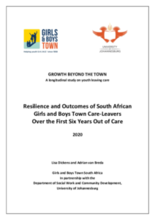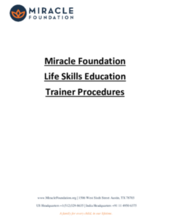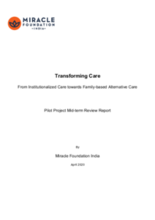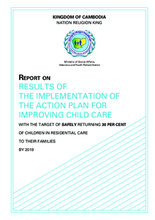Displaying 341 - 350 of 991
This paper reports findings from an innovative arts-based intervention with Looked After Children and Young People and concludes that holding these competing value sets in creative tension is central to the success of the programme in helping young people to cope with and contest social harm.
This study adopted a phenomenological research design, purposively sampling 26 preteens and teenagers living, during the school term, in a Charitable Children's Institution (CCI) that doubles up as their School and then moving to live with foster families during the school holidays. The focal areas of the field study were the young people's experiences in the CCI, the transition to the foster families, and the young people's experiences in foster care.
The aim of this paper is to indicate threats and possibilities as regards the functioning of the foster care system and the process of adult care leavers’ gaining independence.
This report from the UN Office of the SRSG on Violence against Children explores repatriation, rehabilitation, and reintegration of foreign, Iraqi and Syrian children who are being held in detention on suspected ISIS association or terror-related offenses, or in camps.
This report presents the latest findings from the Growth Beyond the Town Girls and Boys Town South Africa (GBTSA)/University of Johannesburg (UJ) joint partnership longitudinal research study. Presented are the findings from 150 participants who were interviewed as they disengaged from GBTSA, as well as the outcomes of many of these care-leavers that have been measured each year during follow-up interviews.
This chapter analyses the educational choices and decisions of young people who have recently transitioned from alternative care to independent living in North-West Russia.
Acest ghid este destinat copiilor și tinerilor care sunt pe cale de a ieși sau deja au ieșit din serviciile de îngrijire alternativă și oferă resurse și sfaturi pentru dezvoltarea abilităților practice de integrare în societate pentru acest grup. Instituțiile guvernamentale, organizațiile non-guvernamentale, societatea civilă și alți actori care susțin acest grup sunt încurajați să tipărească acest ghid și să-l distribuie printre copii și tineri.
Designed for trainers imparting life skills education to children ages 5-18.
This Internal Mid Term Review (MTR) was conducted after completion of Year 1 of a pilot project to create a replicable model for child care institutions (CCIs) to effectively implement Family Based & Alternative Care in India.
This report presents the outcomes of the implementation of the Cambodian Ministry of Social Affairs, Veterans and Youth Rehabilitation (MoSVY) Action Plan for Improving Child Care and the safe return of 30 per cent of children in residential care to their families, including key achievements, lessons learned, and recommendations going forward.

